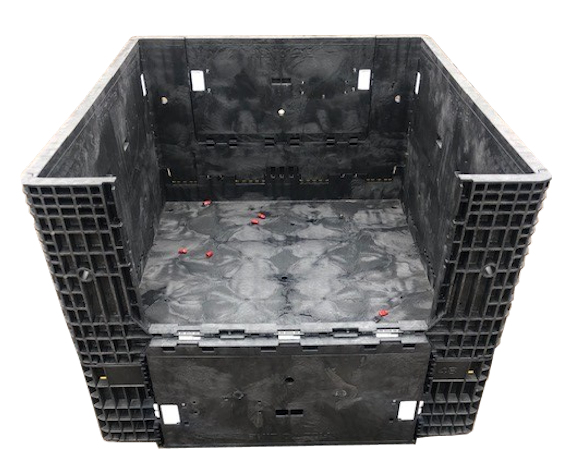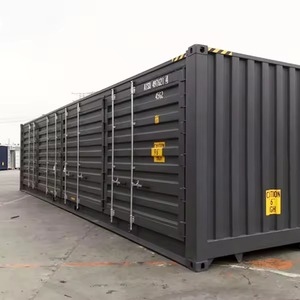Why refurbished bulk containers are eco-friendly solutions for sustainable businesses
Why Mass Containers Are Necessary for Lasting and Economical Transport
Mass containers play a necessary duty in modern-day logistics. They promote the efficient activity of big quantities of goods, thus optimizing transportation processes. This technique not only decreases costs however additionally decreases ecological influence through lower emissions and waste generation. As industries look for more sustainable techniques, the fostering of mass containers is becoming increasingly significant. What ramifications does this shift hold for future logistics and supply chain management?

The Advantages of Using Bulk Containers in Logistics
Bulk containers transform logistics by improving efficiency and sustainability. These containers permit the transportation of big amounts of items in a solitary journey, significantly minimizing the variety of trips required. This not only improves operations however likewise lessens labor expenses related to handling, packing, and unloading. In enhancement, mass containers are developed to enhance space usage within transport cars, guaranteeing that more products can be shipped simultaneously.
The standardization of mass containers also simplifies the logistics process. With consistent measurements, they can be quickly stacked and stored, resulting in enhanced stockroom management. Mass containers usually feature durable products that safeguard contents from damages during transportation, thereby lowering product loss and boosting general reliability. Because of this, businesses can experience boosted supply chain performance, inevitably causing raised earnings and client fulfillment. This mix of aspects makes mass containers a vital possession in modern logistics.
Environmental Influence: Reducing Waste and Carbon Footprint
As markets increasingly focus on sustainability, the fostering of bulk containers has become a key method for decreasing waste and decreasing carbon footprints. These containers decrease using product packaging products, such as boxes and plastic, thus especially decreasing general waste generation. By consolidating shipments, mass containers boost transportation performance, allowing for more items to be carried per journey. This reduction in journeys directly associates with reduced greenhouse gas emissions, contributing to a smaller sized carbon footprint.
Moreover, bulk containers can often be recycled or reused, further minimizing environmental effect. The toughness of these containers warranties they can stand up to numerous transport cycles, decreasing the requirement for single-use choices. used plastic containers. By simplifying logistics and advertising reliable source usage, bulk containers not just support lasting techniques yet additionally urge sectors to straighten with international environmental goals. Ultimately, their execution reflects a dedication to ecological stewardship and responsible source management
Cost Cost Savings: How Mass Containers Lower Transport Expenditures
While lots of business seek methods to enhance their bottom line, using mass containers provides a considerable chance for lowering transport expenditures. Bulk containers maximize the volume of items moved, enabling businesses to deliver bigger quantities at the same time. This effectiveness reduces the variety of journeys needed, straight reducing gas prices and decreasing labor costs connected with loading and dumping.
Furthermore, bulk containers frequently include structured designs that maximize space utilization within transportation cars. This suggests fewer voids, causing extra efficient usage of readily available capacity. The longevity of bulk containers can reduce the threat of product damage during transportation, making certain and minimizing losses that even more goods show up undamaged.
Enhancing Supply Chain Performance With Bulk Storage Solutions
Bulk storage space services play an important function in enhancing supply chain effectiveness by optimizing inventory administration. By settling products into fewer, larger containers, organizations can significantly minimize taking care of prices connected with frequent transfers and processing. This streamlined approach permits much better tracking and administration of inventory, eventually bring about improved operational performance.
Streamlined Inventory Management
Reliable supply administration is crucial for enhancing supply chain operations, specifically when companies take on bulk storage space remedies. These remedies make it possible for organizations to preserve higher supply degrees while decreasing the frequency of replenishment. By combining products into mass containers, companies can improve their inventory processes, decreasing the intricacy connected with tracking multiple smaller sized plans. This technique promotes precise stock matters and boosts projecting precision, permitting more educated decision-making. Furthermore, bulk storage remedies simplify warehouse organization, making it much easier to situate and access products when required. As an outcome, organizations can attain a much more efficient supply turn over rate, inevitably boosting general supply chain performance and reducing the probability of stockouts or overstock circumstances.

Decreased Handling Prices
The application of mass storage space services not just simplifies inventory management however likewise considerably decreases managing expenses throughout the supply chain. By consolidating products into bulk containers, business lessen the demand for frequent handling and transfer between different storage and transportation devices. This approach minimizes labor expenses connected with loading, dumping, and relocating smaller sized packages. Additionally, bulk storage space lowers the regularity of shipments, resulting in lower transport prices and decreased gas usage. As an outcome, businesses can optimize their logistics operations, allowing click here for a much more effective allocation of resources. Ultimately, reduced managing expenses contribute to improved general supply chain effectiveness, promoting an atmosphere that supports both sustainability and economic stability.

Flexibility of Mass Containers Across Different Industries
Lots of markets have distinctive needs for transportation and storage, mass containers have actually emerged as a versatile option that satisfies a vast variety of demands. These containers, ranging from large containers to specialized containers, can fit varied products, consisting of liquids, granules, and powders. In the farming sector, bulk containers help with the transportation of grains and plant foods, while the food and drink sector uses them for active ingredients and ended up items. The chemical sector relies upon bulk containers for safely delivering dangerous materials, making sure compliance with safety policies. Additionally, construction firms benefit from bulk containers for transferring accumulations and various other materials. Their versatility reaches different settings of transport, including ships, trains, and trucks, improving logistical effectiveness. This adaptability not only improves operations across different industries yet also advertises sustainability by decreasing packaging waste and optimizing room en route. Consequently, mass containers play a necessary function in modern supply chain management.
Future Patterns in Bulk Container Use and Sustainability
The future of mass container use is increasingly formed by cutting-edge materials advancement that enhances sustainability. Additionally, automation in logistics guarantees to streamline operations, reducing waste and boosting effectiveness. Accepting round economic situation practices will certainly better reinvent just how bulk containers are developed, made use of, and recycled, cultivating a more lasting transportation landscape.
Ingenious Products Development
As markets significantly prioritize sustainability, ingenious products advancement in bulk containers becomes a significant consider enhancing environmentally friendly transport remedies. Producers and researchers are discovering biodegradable plastics, recycled compounds, and lightweight metals to reduce environmental effect. These products not just reduce waste but also improve fuel performance by reducing the general weight of containers. In addition, innovations in wise products, which can adjust to differing problems, improve the sturdiness and performance of bulk containers. The combination of these ingenious materials lines up with circular economic situation principles, promoting reuse and recycling. As the demand for sustainable practices grows, the advancement of such products will certainly play an essential role fit the future of bulk container usage in logistics and transportation.
Automation in Logistics
Considerable innovations in automation are positioned to change logistics and the utilization of mass containers, enhancing sustainability in transportation. Automated systems, including drones and autonomous cars, are enhancing the activity of mass containers, lowering the reliance on conventional fuel-powered transport. These innovations enhance directing and packing procedures, improving and minimizing vacant miles fuel effectiveness. In addition, automated supply management systems boost tracking and surveillance of mass containers, guaranteeing far better source allotment and lowered waste. The integration of the Net of Points (IoT) permits real-time data analysis, enabling proactive decision-making that straightens with sustainability objectives. As automation proceeds to evolve, it is anticipated to drive even more developments in bulk container usage, eventually sustaining more sustainable logistics practices and decreasing the environmental effect of transportation.
Circular Economy Practices
Improvements in automation are setting the phase for a more integrated technique to circular economy methods in the domain name of mass container use. As markets progressively embrace sustainability, mass containers are being made for long life and reusability. This shift not just decreases waste however likewise boosts resource effectiveness. Firms are adopting strategies such as closed-loop systems, where utilized containers are gathered, refurbished, and reintroduced right into the supply chain. In addition, smart technologies track container life process, facilitating better management and reducing ecological influence. The cooperation in between manufacturers, logistics service providers, and end-users is necessary in developing requirements for lasting container usage. used bulk containers. Future trends indicate a growing focus on materials that are naturally degradable and recyclable, further enhancing the circular economic situation's principles wholesale transportation

Often Asked Concerns
What Materials Are Mass Containers Generally Made From?
Bulk containers are generally constructed from sturdy materials such as high-density polyethylene, aluminum, steel, and cardboard. These materials offer adaptability, toughness, and security, making them ideal for moving different items in different industries successfully.
Exactly how Do I Choose the Right Size Bulk Container?
Choosing the ideal dimension bulk container involves evaluating the quantity of materials to be transferred, considering taking care of tools compatibility, and appraising storage space demands. Proper size warranties efficiency in transport and lessens waste throughout shipment.
Are Mass Containers Reusable or Recyclable?
Bulk containers are often reusable, designed for multiple trips, enhancing sustainability. Many can likewise be recycled, relying on the materials made use of. Picking recyclable choices better lowers and supports environmental goals waste in transportation methods.
What Security Rules Relate To Bulk Container Transportation?
Safety and security guidelines for mass container transportation include conformity with the Division of Transport guidelines, appropriate labeling of hazardous materials, architectural integrity analyses, and adherence to weight restrictions to assure secure handling and stop crashes during transportation.
Exactly How Can Businesses Change to Utilizing Mass Containers Properly?
Companies can transform to bulk containers by reviewing current logistics, educating staff on handling, investing in appropriate equipment, enhancing supply management, and teaming up with vendors to ensure compatibility and performance throughout the supply chain.
As markets progressively prioritize sustainability, the adoption of mass containers has arised as an essential strategy for minimizing waste and decreasing carbon impacts. By consolidating materials into bulk containers, companies can enhance their supply procedures, minimizing the complexity linked with tracking several smaller packages. As industries progressively focus on sustainability, innovative products growth in mass containers emerges as a considerable factor in enhancing green transportation services. Automated systems, consisting of drones and autonomous automobiles, are simplifying the activity of bulk containers, decreasing the reliance on traditional fuel-powered transportation. In addition, automated stock administration systems improve tracking and tracking of mass containers, making certain better resource allowance and lowered waste.